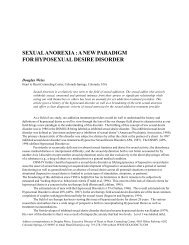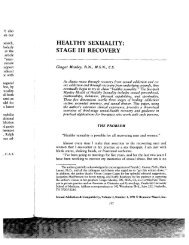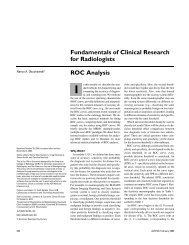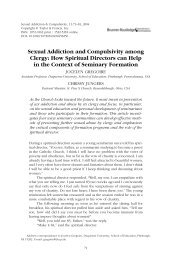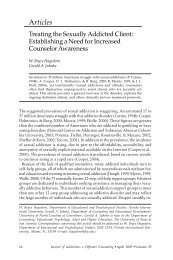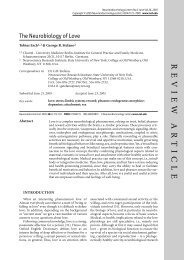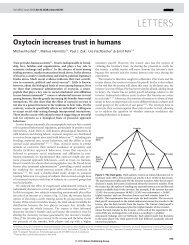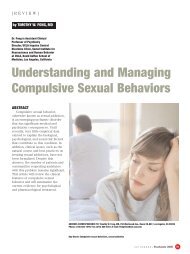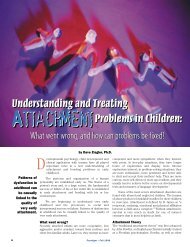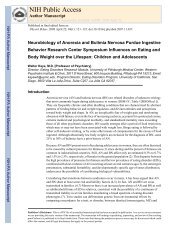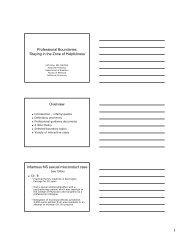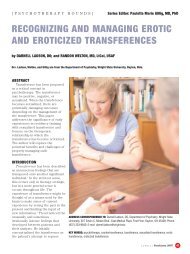An Overview of Psychiatric Ethics
An Overview of Psychiatric Ethics
An Overview of Psychiatric Ethics
Create successful ePaper yourself
Turn your PDF publications into a flip-book with our unique Google optimized e-Paper software.
1. In agreement with the UN Resolution 46/119 <strong>of</strong> the “Principles for the Protection <strong>of</strong> Persons withMental Illness”, psychiatrists should oppose discriminatory practices which limit their benefits andentitlements, deny parity, curb the scope <strong>of</strong> treatment, or limit their access to proper medicationsfor patients with a mental disorder.2. Pr<strong>of</strong>essional independence to apply best practice guidelines and clinical wisdom in upholdingthe welfare <strong>of</strong> the patient should be the primary considerations for the psychiatrist. It is also theduty <strong>of</strong> the psychiatrist to protect the patient privacy and confidentiality as part <strong>of</strong> preserving thesanctity and healing potential <strong>of</strong> the doctor-patient relationship.Violating the Clinical Boundaries and Trust between Psychiatrists and Patients: Thepsychiatrist-patient relationship may be the only relationship that permits an exploration <strong>of</strong> the deeplypersonal and emotional space, as granted by the patient. Within this relationship, the psychiatrist’srespect for the humanity and dignity <strong>of</strong> the patient builds a foundation <strong>of</strong> trust that is essentialfor a comprehensive treatment plan. The relationship encourages the patient to explore deeplyheld strengths, weaknesses, fears, and desires, and many <strong>of</strong> these might be related to sexuality.Knowledge <strong>of</strong> these characteristics <strong>of</strong> the patient places the psychiatrist in a position <strong>of</strong> advantagethat the patient allows on the expectation <strong>of</strong> trust and respect. Taking advantage <strong>of</strong> that knowledgeby manipulating the patient’s sexual fears and desires in order to obtain sexual access is a breach <strong>of</strong>the trust, regardless <strong>of</strong> consent. In the therapeutic relationship, consent on the part <strong>of</strong> the patient isconsidered vitiated by the knowledge the psychiatrist possesses about the patient and by the powerdifferential that vests the psychiatrist with special authority over the patient. Consent under thesecircumstances will be tantamount to exploitation <strong>of</strong> the patient.61The latent sexual dynamics inherent in all relationships can become manifest in the course <strong>of</strong> thetherapeutic relationship and if they are not properly handled by the therapist can produce anguishto the patient. This anguish is likely to become more pronounced if seductive statements andinappropriate non-verbal behaviour are used by the therapist. Under no circumstances, therefore,should a psychiatrist get involved with a patient in any form <strong>of</strong> sexual behaviour, irrespective <strong>of</strong>whether this behaviour is initiated by the patient or the therapist.Protection <strong>of</strong> the Rights <strong>of</strong> Psychiatrists: Psychiatrists need to protect their right to live up tothe obligations <strong>of</strong> their pr<strong>of</strong>ession and to the expectations the public has <strong>of</strong> them to treat and toadvocate for the welfare <strong>of</strong> their patients. Psychiatrists ought to have the right to practice theirspecialty at the highest level <strong>of</strong> excellence by providing independent assessments <strong>of</strong> a person’smental condition and by instituting effective treatment and management protocols in accordancewith best practices and evidence-based medicine. There are aspects in the history <strong>of</strong> psychiatry andin present working expectations in some totalitarian political regimes and pr<strong>of</strong>it-driven economicalsystems that increase psychiatrists’ vulnerabilities to be abused in the sense <strong>of</strong> having to acquiesceto inappropriate demands to provide inaccurate psychiatric reports that help the system, butdamage the interests <strong>of</strong> the person being assessed.Psychiatrists also share the stigma <strong>of</strong> their patients and, similarly, can become victims <strong>of</strong>discriminatory practices. It should be the right and the obligation <strong>of</strong> psychiatrists to practice theirpr<strong>of</strong>ession and to advocate for the medical needs and the social and political rights <strong>of</strong> their patientswithout suffering being outcast by the pr<strong>of</strong>ession, being ridiculed in the media or persecuted.Disclosing the Diagnosis <strong>of</strong> Alzheimer’s Disease (AD) and Other Dementias: AD patient’s rightto know is now a well established priority, recognised by healthcare pr<strong>of</strong>essionals. Most patientswant all information available and to be actively involved in making decisions about treatments. Atthe same time, patients have the right also not to know if that is their wish. All must be given theopportunity to learn as much or as little as they want to know.The alteration <strong>of</strong> patient’s cognition makes the ability to make judgements and gain insight moredifficult. Patients with dementia are also <strong>of</strong>ten brought by family members which introduces a thirdpartner into the doctor-patient relationship.Doctors, patients and families who share the responsibilities for fighting and coping with Alzheimer’sdisease for years all require access to information on the disease, including the diagnosis.IMET AN OVERVIEW OF PSYCHIATRIC ETHICS



